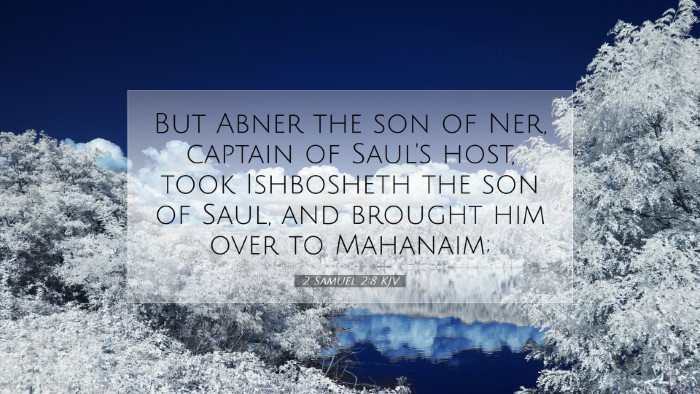Commentary on 2 Samuel 2:8
Verse Context: The passage in 2 Samuel 2:8 is set in a crucial transitional period in Israel's history following the death of King Saul. David, already anointed by Samuel, emerges as a key figure, amidst the struggles for leadership and authority. This verse introduces Abner, Saul's former general, indicating the complexities of political power and tribal allegiance.
Exegesis of 2 Samuel 2:8
“But Abner the son of Ner, captain of Saul's host, took Ish-bosheth the son of Saul, and brought him over to Mahanaim.”
This verse illustrates Abner's pivotal role in the political machinations of Israel following Saul's demise. His actions reflect not only loyalty to Saul's house but also underscore the underlying tensions among the tribes of Israel.
Insights from Matthew Henry
- Abner's Decision: Henry emphasizes that Abner's act of elevating Ish-bosheth is a deliberate move to maintain the influence of Saul's lineage, despite David being the anointed king. This indicates a struggle for power that reflects the broader themes of loyalty and betrayal in leadership.
- Political Strategy: Henry notes that Abner's actions can be seen as a strategic attempt to consolidate power within Benjamite tribes, thereby creating a counterbalance to David’s growing influence in Judah.
- Mahanaim as a Stronghold: The choice of Mahanaim, a city east of the Jordan, signifies a tactical decision—it is a stronghold that offers security and a base for operations against David. This geographical consideration plays a crucial role in the unfolding narrative.
Insights from Albert Barnes
- Abner's Authority: Barnes points out that Abner's prominence as captain suggests a significant military and political authority, one that he wields in opposition to David. His quick elevation of Ish-bosheth raises questions about the legitimacy and strength of Ish-bosheth's claim to kingship.
- Dynamics of Leadership: The commentary elaborates on the dynamics of leadership and the selection of Ish-bosheth. Barnes outlines that this act signifies division within the tribes and a reluctance among some to accept David as king, foreshadowing the civil strife that will ensue.
- Religious Undercurrents: Barnes also reflects on the moral and religious implications. The tension between divine appointment (David) and human selection (Ish-bosheth) raises questions about God’s sovereignty in human affairs, which is a recurring theme throughout the biblical narrative.
Insights from Adam Clarke
- Historical Context: Clarke provides a rich historical background to Abner’s decision, suggesting that it stemmed from the civil unrest that followed Saul’s death. He emphasizes the contrast between David’s rightful claim and Ish-bosheth's opportunistic rise.
- Character Studies: Clarke delves into character analysis, describing Abner as a figure caught between loyalty to Saul's memory and the inevitability of David's kingship. This duality makes Abner a tragic figure in the narrative.
- Symbolic Interpretation: Clarke also interprets Mahanaim as a symbol of resistance against the divine will represented by David. This points to the larger theme of struggle between divine and human governance, inviting further reflection on the nature of authority.
Theological Reflections
The elevation of Ish-bosheth by Abner serves not only as a historical event but also as an illustration of the ongoing conflicts in leadership choices faced by communities of faith. At its heart lies a profound theological question: In what ways do human authority and divine appointment intersect?
Pastors and theologians may draw from this commentary to explore themes of church leadership, loyalty, and the challenges of unifying divided communities under God's intended direction. The political maneuvering of Abner can be paralleled with contemporary issues within church governance and leadership transitions.
Contemporary Application
For modern readers, this verse serves as a reminder of the complexities involved in leadership and the importance of aligning with God's purpose. As churches face transitions, the tension illustrated in this passage can serve as a guide to navigate conflicts of loyalty and vision.
- Encouragement of Unity: Leaders are called to seek unity that honors God's purposes rather than personal ambitions.
- Discernment: Believers are urged to remain discerning regarding leadership in their congregations and to recognize God’s ultimate authority.
- Faithful Stewardship: The narrative encourages a reflection on whether current leaders are representing God's will and intentions amid human complexities.
Conclusion
The events surrounding 2 Samuel 2:8 encapsulate the challenges of leadership and the political intrigue of ancient Israel. The insights drawn from public domain commentaries reveal a rich tapestry of theological, historical, and practical applications, making this text a vital consideration for contemporary faith communities. As leaders and congregations respond to the legacy of Abner and Ish-bosheth, their journey may offer profound lessons on faithfulness, discernment, and the significance of divine appointment.


